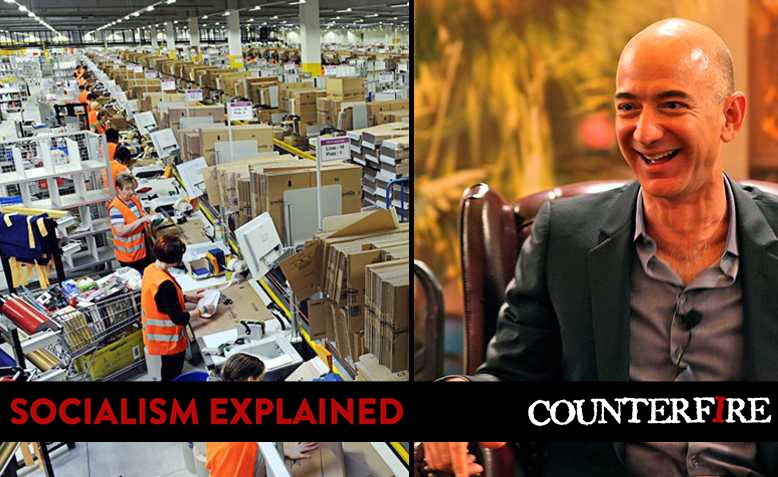 Photos: Amazon Warehouse by Scott Lewis (left), Jeff Bezos by Steve Jurvetson / CC BY 2.0, licence and original photos linked at bottom of article
Photos: Amazon Warehouse by Scott Lewis (left), Jeff Bezos by Steve Jurvetson / CC BY 2.0, licence and original photos linked at bottom of article
David McAllister explains what the working class is and why it’s central to transforming society
Counterfire’s Socialist Explainers series
Oxfam reported in 2019 that the richest 26 individuals possess the same wealth as the poorest 50% of the human race. This stark statistic points to the most fundamental division in society, that between the super-rich and the majority. Understanding it is central to grasping how society works. And it is also vital to understanding how it could be transformed.
Mainstream discussions of class often focus on lifestyle or culture, whether someone owns a house, where they live, or even their dress sense or diet. While these things can be pointers, they don’t get us very far. Even income doesn’t get to the bottom of how class actually operates and shapes society.
Capitalism is based on production for profit. This profit goes into the hands of a tiny minority of people who own and run business, whether it’s a software company, a supermarket chain, a hotel business, or an arms company.
These are the capitalists proper, modern members of what Marx and Engels called the bourgeoisie. As they accumulate huge levels of wealth they are backed by the power of state institutions which by and large govern in their interests.
Then there is the class which has nothing to sell but their labour – their work. Nowadays workers are the overwhelming majority around the world. Workers are exploited by capitalists, because the wages they earn are a fraction of the wealth the capitalist pockets from production. Other classes in society, the middle class say, or an independent peasantry in some countries, fit in different ways into an economy driven relentlessly by this central process, the extraction of profit from working people by big business.
Which class you belong to, therefore, is defined by your relationship to the means of production – how you fit into the system of production and distribution. The nature of the work changes over time. Marx and Engels’ time was marked by the growth of heavy manual industry, including mills, shipyards and mines. The decline in manufacturing in Britain means that white collar and service work is now a more common experience.
This has led some commentators to suggest the working class has actually disappeared. But class is a social relationship, centred around the production of goods, services and wealth. As such, exploitation remains the reality, whether it happens in a coal mine or a supermarket.
This relationship between the two classes brings us to the class struggle. The capitalists are locked into competition with each other to make as much profit as possible. Workers have an interest in the opposite; in clinging on to as much as possible of the value of what they produce.
This puts workers in a unique position in society. Capitalists are dependant upon workers for profit, and workers form the overwhelming majority in society. If they can overcome internal divisions by challenging all forms of oppression, workers have tremendous power. When they take strike action they can bring the central drive of the system to a halt.
In Britain, it has been some time since we saw mass resistance in the workplaces. British politics over the last 40 years has been marked by a relentless assault on the working class and its organisations.
However, neoliberal capitalism has also led to a growing feeling that the system is rigged against working people. One product of this has been a sharp increase in street protests, particularly in the last twenty years. This sense of anger and injustice also found expression in Jeremy Corbyn’s leadership of the Labour Party, with its central slogan ‘for the many, not the few’. When this accumulated anger is connected to organisation at the point of production, the result can be explosive.
This is why class remains so fundamental. It is not just a benign way of categorising people. In essence, class is really a description of how society is actually run. Without a firm grasp of this, there cannot be any serious understanding of capitalism and the fight against it.
Fund the fightback
We urgently need stronger socialist organisation to push for the widest possible resistance and put the case for change. Please donate generously to this year’s Counterfire appeal and help us meet our £25,000 target as fast as possible.

